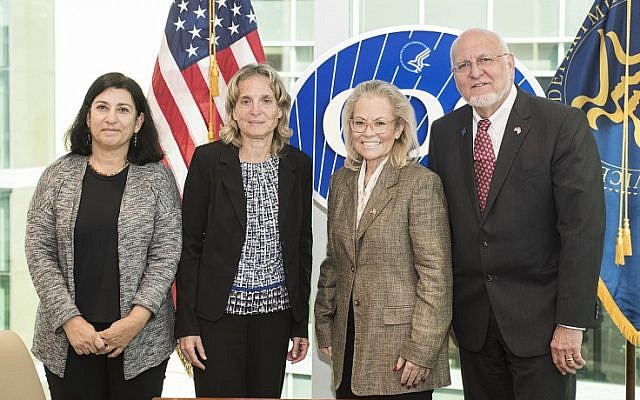Israel’s CDC Comes to Atlanta
In an effort to work collaboratively with Center for Disease Control, Dr. Tamar Shohat visited Atlanta for the first time in years.

Perhaps the best kept secret in the national public health arena is that there’s an Israel Center for Disease Control. The secret is safe from Americans, Israelis and even Atlantans, where our nation’s Centers for Disease Control and Prevention is headquartered. But this little-known revelation isn’t by design. In fact, when Dr. Tamar Shohat, director of the ICDC, was in Atlanta last month, she was busy giving interviews to raise awareness about the organization she helped start in 1994.
Still, it’s been seven years since she visited the CDC here. One of her goals in her meetings since March with Dr. Robert R. Redfield, director of the CDC, was “to establish more regular meetings” between the two organizations.
According to Ambassador Judith Varnai Shorer, consul general of Israel to the Southeast, “We had an important meeting speaking about the cooperation between the CDC and the ICDC, and about the exchange of expertise on an annual basis on various spheres between the two organizations.”
Another goal of the meeting was to compare notes and learn from each other. “We must all work together to combat the challenging public health threats facing the world,” Redfield said in a statement. However, although both centers are under their respective country’s national health departments – in Israel, under the Ministry of Health, in the U.S., under the Department of Health and Human Services – there are vast differences between the two.
Part of those differences are because of the huge disparity in size of the countries.
Just as important is the fact that in the United States, citizens receive health care through a private system, and private insurance. In Israel, there is a national health system with four HMOs that cover all its nearly 9 million people. “We have the same problems, with fewer people,” Shohat told the AJT. “We collect national data for influenza so that we know which viruses are circulating” and can prepare appropriate vaccines.
The primary goal for both centers is to provide “solid” evidence so that policymakers can make informed decisions. “We are like an applied research unit in charge of collecting data and building registry,” said Shohat, who has been the ICDC director since January 2008. Although most of her education was in Israel, she completed a fellowship in medical genetics at Cedars-Sinai Medical Center in Los Angeles, where she later held a visiting scientist position.
The primary activities of the ICDC include: carrying out periodic national surveys on the health of the population, establishing and maintaining national disease registries, studying chronic diseases and their determinants, and training students and physicians in public health, as well as surveillance of infectious diseases and unusual morbidity.
While she was here, Shohat also visited Emory University’s School of Health, which is affiliated with Tel Aviv University. She told the AJT that she wanted to learn about new teaching methods and ways to update the curriculum in Israel. “I wanted to see what we are missing from our programs,” she said.
Shohat said that “in many aspects, Israel is similar to the United States. We have the same lifestyle, more or less. Our cancer rates are similar, and we have similar trends, such as a decline in smoking, although it’s still higher in Israel.” But the means of cancer detection do differ. For instance, in the United States, everyone from ages 50 to 74 is encouraged to have colonoscopies to detect colon cancer. In Israel, the first-line of detection recommended is a blood test, unless the person is judged to be at higher risk. Even so, the incidence and survival rates are the same in the two countries, she said.
In addition, since there’s a much higher percentage of citizens from an Ashkenazi or Eastern European background in Israel, genetic defects associated with that background also have a higher impact on the country. There’s a proposal in Israel that all Ashkenazi citizens be tested for the BRCA genetic defect that leads to a higher chance of being diagnosed with breast, colon and ovarian cancers, Shohat said. Currently, only those who have family members with those cancers are tested, essentially as it is in the United States.
Like the two countries, there’s an enormous difference in the size of the two CDCs, Shohat added. “ICDC has only 80 people,” she said, up from the four who launched it 24 years ago. “CDC has 15,000.”



comments